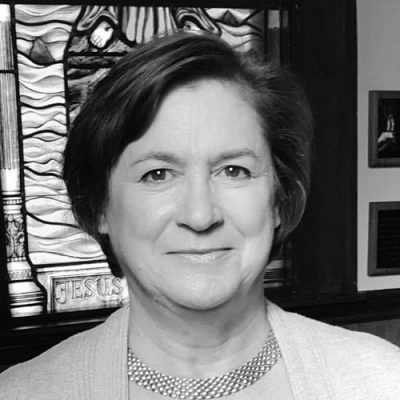Moral Theology and the Sanctification of Time
Required Materials:
Books and supplies are not included in the purchase of the course.
- Victor Lee Austin, Christian Ethics: A Guide for the Perplexed
- ISBN: 978-0567032201
- Aristotle, Nicomachean Ethics. Translated by Terence Irwin. Hackett Publishing Co.
- ISBN: 978-1624668159
- Note that it is essential to get the correct translation of Aristotle in print. Kindle editions are often not the same translation. Use the ISBN to purchase a print copy.
- Josef Pieper, The Four Cardinal Virtues. U. of Notre Dame Press.
- ISBN: 978-0268001032
- Jane Austen, Emma (any edition)
- The 1662 Book of Common Prayer, International Edition. IVP Academic, 2021
- ISBN: 978-0830841929
- A Bible (any version)
- Other reading selections will be provided by the instructor

Rhea Bright
[email protected]Rhea Bright, Chair of The Canterbury House of Studies, holds a B.A. from the University of King’s College in Halifax, Nova Scotia, and an M.A. in Classics from Dalhousie University, also in Halifax. Her Classical studies involved Latin and Greek, as well as classical and medieval literature, philosophy and theology. King’s Foundation Year Program, an early integrated great books curriculum, and the Dalhousie Classics department formed and nurtured what became a life-long love of the classics and a deep appreciation of the contribution of the ancient world to whatsoever is good and true and beautiful. She also has a Bachelor of Education from Acadia University in Wolfville, N.S. Rhea taught Ancient and Medieval Humanities at the University of Central Oklahoma for nine years, and over the course of ten years at Providence Hall and The Academy of Classical Christian Studies, she taught Latin, Logic, Bible, and integrated ancient literature and history. Rhea is married to Father Patrick Bright, an ordained Anglican priest who served for over 24 years at All Souls’ Episcopal Church in Oklahoma City and recently retired from full-time ministry. Together they raised five sons, now grown. They now live in a 170-year-old house in rural Nova Scotia.
Quarter 1
- Victor Lee Austin, Christian Ethics
- Contemporary challenges to ethics
- Ethics as proper to being human
- Aristotle, Nicomachean Ethics:
- The Good for Mankind
- Moral Virtues
- Intellectual Virtues
- Continence & Incontinence
Quarter 2
- Aristotle, Nicomachean Ethics
- Friendship
- Pleasure
- Happiness
- Josef Pieper, The Four Cardinal Virtues
- Prudence
- Justice
- Fortitude
- Temperance
Quarter 3
- Jane Austen, Emma
- Victor Lee Austin, Christian Ethics
- The Theological Virtues: Faith, Hope, Love
- Friendship in the light of the theological virtues
- Further readings on Faith, Hope, and Love including Thomas Aquinas and Jeremy Taylor
Quarter 4
- The Sanctification of Time: Spiritual Formation through Scripture, Prayer and Worship
- Common Prayer and the Daily Offices
- The Office Lectionary
- The Psalter
- The Liturgical Year
- The Holy Communion
- The Eucharistic Lectionary
- The Other Rites of the Church
![]() Computer: You will
need a stable, reliable computer, running with a processor with a speed of 1 GHz or better
on one of the following operating systems: Mac OS X with Mac OS 10.7 or later; Windows 8,
7, Vista (with SP1 or later), or XP (with SP3 or later). We do not recommend using an
iPad or other tablet for joining classes. An inexpensive laptop or netbook would be much
better solutions, as they enable you to plug an Ethernet cable directly into your computer.
Please note that Chromebooks are allowed but not preferred, as they do not support certain
features of the Zoom video conference software such as breakout sessions and annotation,
which may be used by our teachers for class activities.
Computer: You will
need a stable, reliable computer, running with a processor with a speed of 1 GHz or better
on one of the following operating systems: Mac OS X with Mac OS 10.7 or later; Windows 8,
7, Vista (with SP1 or later), or XP (with SP3 or later). We do not recommend using an
iPad or other tablet for joining classes. An inexpensive laptop or netbook would be much
better solutions, as they enable you to plug an Ethernet cable directly into your computer.
Please note that Chromebooks are allowed but not preferred, as they do not support certain
features of the Zoom video conference software such as breakout sessions and annotation,
which may be used by our teachers for class activities.
![]() High-Speed Internet Connection:
You will also need access to high-speed Internet, preferably accessible via Ethernet
cable right into your computer. Using Wi-Fi may work, but will not guarantee you the optimal
use of your bandwidth. The faster your Internet, the better. We recommend using a connection
with a download/upload speed of 5/1 Mbps or better. You can test your Internet connection here.
High-Speed Internet Connection:
You will also need access to high-speed Internet, preferably accessible via Ethernet
cable right into your computer. Using Wi-Fi may work, but will not guarantee you the optimal
use of your bandwidth. The faster your Internet, the better. We recommend using a connection
with a download/upload speed of 5/1 Mbps or better. You can test your Internet connection here.
![]() Webcam: You may
use an external webcam or one that is built in to the computer. Webcam Recommendations:
Good (PC only) | Best (Mac and PC)
Webcam: You may
use an external webcam or one that is built in to the computer. Webcam Recommendations:
Good (PC only) | Best (Mac and PC)
![]() Headset: We recommend
using a headset rather than a built-in microphone and speakers. Using a headset reduces the
level of background noise heard by the entire class. Headset Recommendations: USB | 3.5mm
Headset: We recommend
using a headset rather than a built-in microphone and speakers. Using a headset reduces the
level of background noise heard by the entire class. Headset Recommendations: USB | 3.5mm
![]() Zoom: We use a web
conferencing software called Zoom for our classes, which enables students and teachers to
gather from around the globe face to face in real time. Zoom is free to download and easy
to use.
Zoom: We use a web
conferencing software called Zoom for our classes, which enables students and teachers to
gather from around the globe face to face in real time. Zoom is free to download and easy
to use.  To
download Zoom:
To
download Zoom:
- Visit zoom.us/download.
- Click to download the first option listed, Zoom Client for Meetings.
- Open and run the installer on your computer.
- In August, students will be provided with instructions and a link for joining their particular class.
![]() Scanner: In this
class, students frequently submit homework assignments by scanning pages from their workbooks.
Students and/or their parents should have easy access to a scanner and the ability to use it.
Scanner: In this
class, students frequently submit homework assignments by scanning pages from their workbooks.
Students and/or their parents should have easy access to a scanner and the ability to use it.
Step 1
Step 2
Step 3
Step 4
Explore our courses!
First, read the available course descriptions, noting prerequisites, target grades, and course objectives. If you think your student is prepared for the course, go ahead and register. After registration, a placement assessment may be provided to students, depending on the course and the student’s previous enrollment with Scholé Academy. Registration is finalized when the student’s placement assessment has been returned by the course instructor with placement confirmation.
All Courses | By Grade
Read the Student-Parent Handbook.
Please take careful note of our teaching philosophy, our technology requirements, our school policies, the parent agreement, and the distinctions between our grade levels.
Double-check the course section dates and times.
Make sure they don't conflict with other activities in your schedule or other courses you are purchasing. Our system will not catch double-bookings!
You're ready to add course selections to your cart!
Our Assistant to the Principal will be in touch with you after your enrollment to help you with next steps, including any placement evaluations that may be required for your course selections.
This registration will be finalized when the student's placement assessment has been returned by the course instructor with placement confirmation.
